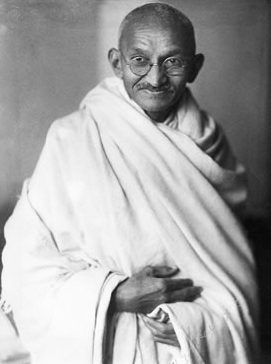
http://en.wikipedia.org/wiki/Mahatma_Gandhi
|
Brief Bio and links |

Links: |
Be the change that you want to see in the world. --Mohandas Gandhi Gandhi was a major political and spiritual leader of the Indian independence movement. He was the pioneer of Satyagraha — resistance through mass civil disobedience strongly founded upon ahimsa (non-violence) becoming one of the strongest philosophies of freedom struggles worldwide. Gandhi first employed his ideas of civil disobedience in the Indian struggle for civil rights in South Africa. Upon his return to India, Gandhi helped lead poor farmers and labourers to protest oppressive taxation and widespread discrimination. Leading the Indian National Congress, Gandhi worked for the alleviation of poverty, the liberation of women, brotherhood amongst diverse communities, an end to untouchability and caste discrimination and for the economic self-sufficiency of the nation. But Gandhi's work focused upon the goal of Swaraj — the independence of India. Gandhi famously led Indians in the disobedience of the salt tax through the 400 kilometre (248 miles) Dandi March in 1930, and in an open call for the British to Quit India in 1942. Gandhi remained committed to non-violence and truth even in the most extreme situations. Gandhi was a student of Hindu philosophy and lived simply, organizing an ashram that was self-sufficient in its needs. He made his own clothes and lived on a simple vegetarian diet. He used rigorous fasts for self-purification as well as a means of protest. Gandhi's teachings have inspired civil rights leaders such as Dr. Martin Luther King Jr., Steve Biko, Nelson Mandela and Aung San Suu Kyi. Gandhi is honoured as the Father of the Nation in India and his birthday on October 2 is annually commemorated as Gandhi Jayanti, a national holiday. (http://en.wikipedia.org/wiki/Mahatma_Gandhi) |